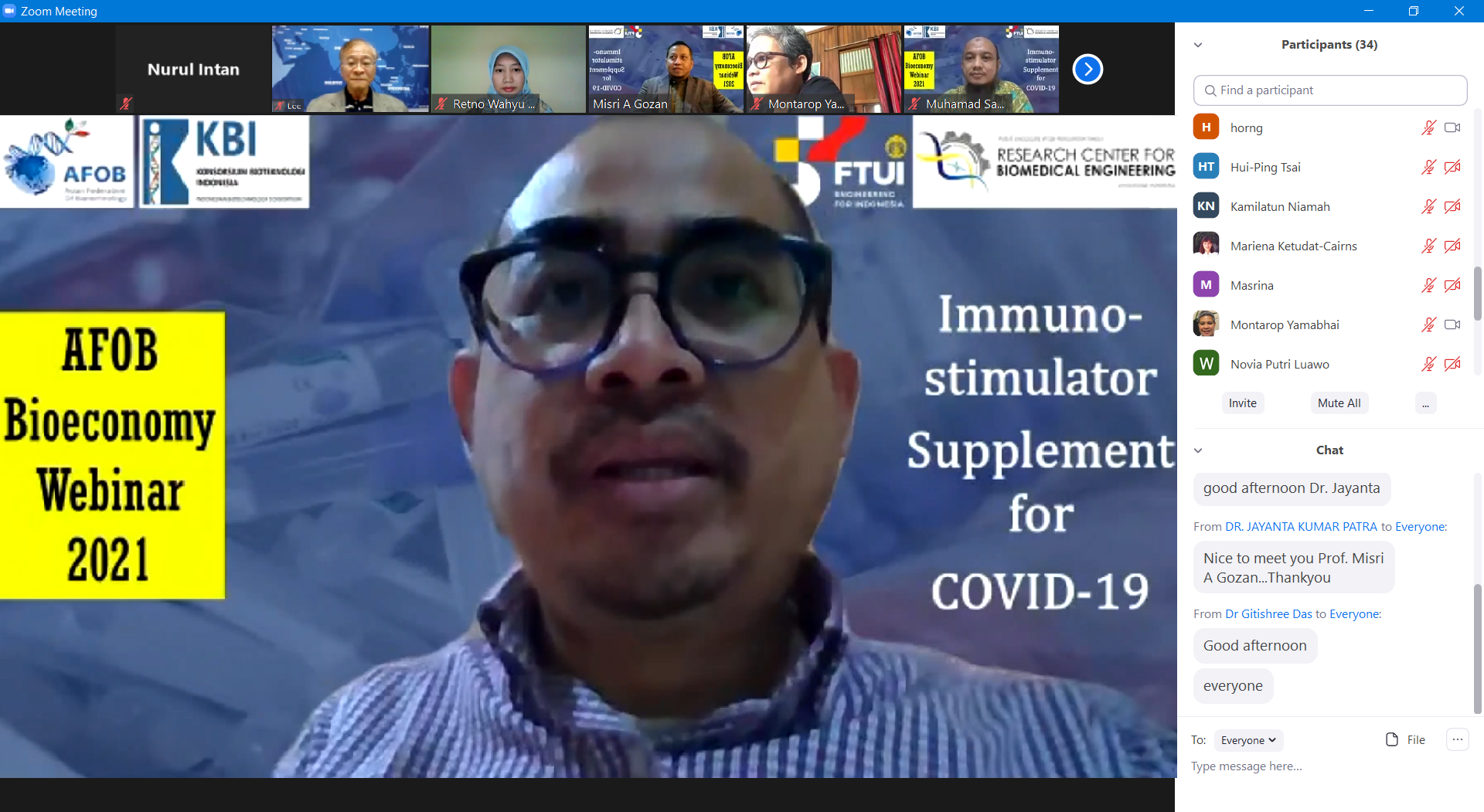The AFOB Bioeconomy Webinar 2021 entitled “IMMUNOSTIMULATOR SUPPLEMENT FOR COVID-19” has been successfully held on Wednesday, April 28th, 2021. This event was organized by the Asian Federation of Biotechnology (AFOB) in partnership with Research Center for Biomedical Engineering (RCBE) Universitas Indonesia and Indonesian Biotechnology Consortium (Konsorsium Bioteknologi Indonesia/KBI).
The webinar’s opening ceremony features opening messages from Prof. Wen-Chien Lee, President of AFOB, Dr. Yudan Whulanza, Director of RCBE UI, and Dr. Siswa Setyahadi, President of KBI and also the AFOB Indonesia Inauguration Ceremony. Five renowned speakers were invited to give talks on their various research on Immunostimulator Supplement For Covid-19 in their respective countries.
The first speaker, Dr Masteria Yunovilsa Putra from the Center for Drug Discovery and Development research group from Indonesian Institute of Sciences (LIPI) talks about Antivirals and Immunomodulators to Fight COVID-19 from Indonesian Biodiversity. This research is based on the fact that Indonesia, as the world’s largest archipelagic country with 17,508 islands and 81,000 km of coastline, is worldwide recognized as being the richest in the world in term of diversity of plant and marine organisms.
Dr Masteria Yunovilsa Putra and his research team explores the potencies of plant and marine metabolites for anti-SARS CoV 2 application. At least 62 compounds from 25 plants extracts and 35 compounds from 33 marine organisms have been identified to have the antiviral potencies. Among them, corilagin, dieckol phlorofucofuroeckol A, proanthocyanidins and isovitexin were recognized to have lower energy Gibbs to bind with hACE2, receptor for SARS CoV2, compared to currently approved antiSARS-Cov2 drug, redemsivir. This in silico studies were used as a preliminary step to design in vitro and in vivo studies. The further study was conducted with whole plant extract, e.g. Sambiloto extract, to improve the efficacy and shorten time for proposing clinical studies. In vitro studies showed that Sambiloto extract could reduce the 3CL protease SARS CoV-2 activity suggesting its promising potency to alter SARS CoV 2 replication. In the current time, this research group conducted clinical trial “IMMUNOCOV-19” of herbal medicines as immunomodulator at Indonesian largest emergeny hospital (RSDC Wisma Athlit) to fight COVID-19.
The anti-SARS-Cov2 potency of Perrilla leaf extract in a Hamster Model is explored by Prof Jim-Tong Horn’s team from Chang Gung University (Taiwan) as our second speaker. The current approved anti-SARS Cov2 drugs are synthetic chemical drugs in which deals with the safety and highly mutated virus strains. Therefore, this group explore the potency of traditional Chinese medicine (TCM) as an alternative to complement the synthetic drugs. The perilla leaves have different ethno-pharmacological effects with seeds, therefore wise consideration should be taken to choose the part of Perilla plant used for the medication. The in vitro studies with virus-infected Vero cells and in vivo studies with hamster models showed that dose-dependent Perilla leaves have a potency to inhibit the SARS Cov2 via direct virus inactivation.
The third speaker, Dr. Ruttiros Khonkarn from Chiang Mai University (Thailand) talks about combining eastern and western medical system in his speech on East meets West: Application of Traditional Medicines using Drug Delivery Systems. Herbal medicines possess several limitations e.g. insoluble materials, low solubility, low bioavailability, lack of targeting capability. Moreover, complex polyherbal systems are still facing the challenges on standardization and identification of individual drug components. Nano-sized drug delivery system is an option to solve the scientific needs for herbal medicines. Dr Ruttiros Khonkarn team is developing self-nano-emulsifying drug delivery systems (SNEDDS) to improve the aqueous solubility and bioavailability of andrographolide/sambiloto extract.
Prof. Dipendra Kumar Mitra and Prof. Dr. Anant Mohan from All India Institute of Medical Sciences, India as the fourth speakers talks about Covid Pandemic in India: One Year Onwards. The capacity of India to flatten the COVID cases curve in early 2021 has inspired many countries to implement the similar strategies to combat the COVID pandemic. India used antigen test to confirm a positive Covid-19 case in addition to the slow PCR test therefore positive cases could be detected earlier. Moreover, the India applied lockdown in some areas, developed effective medical treatments, and manufactured enough personal protective equipments, drugs, and ventilators. However, the flattening curve suddenly changed to the opposite situation in which COVID cases increasing uncontrollably.
Prof. Dipendra Kumar Mitra and Prof. Anant Mohan explained that this drastic changed was caused by many factors including new mutated viruses, large people gathering due to religion or family events, early uplifting of travel ban from high-risk countries and lacking in discipline to practice health protocols among people. The new mutated SARS CoV2 caused increasing fatalities/mortalities for relatively young patients and patients without comorbid in India. India is the second most populated country in the world, therefore, even India is one of the biggest vaccine-producer in the world, it is quite challenging to vaccinate most of their people to achieve herd immunity.
The final speaker, Dr.Eng Muhamad Sahlan, S.Si., M.Eng from Universitas Indonesia explains his research on The Use of Propolis for COVID-19 Treatment. Propolis is a product derived from resins and plant exudates. The interesting point is honey bees in colonies that produce more propolis are healthier and live longer because propolis consumption augments their immune response to microbial challenge. Studies directed by Dr Muhammad Sahlan from Universitas Indonesia is investigating the potency of propolis to inhibit the SARS CoV 2 replication. Propolis compounds can potentially interact with main protease of coronavirus SARS-CoV-2, MPRO based on in silico study. Moreover, propolis can interact with ACE2 and TMPRSS2, potentially blocking or reducing SARS-CoV-2 invasion of the host cell. Dr Sahlan group developed microencapsulated propolis spray dry extract to improved physical appearance and the solubility index and protected and enhanced bioactive compound. A clinical safety study is currently carried out at the Dr. Soekardjo Hospital Tasikmalaya, West Java in order to assess the efficacy of imunomodulator, of microencapsulated propolis extract.

